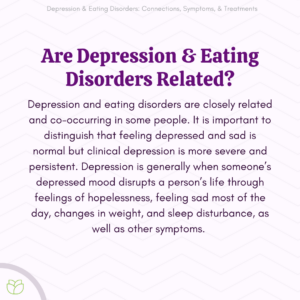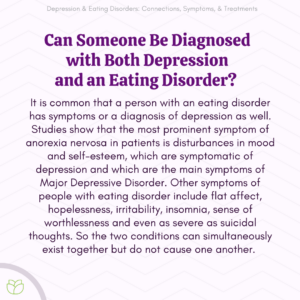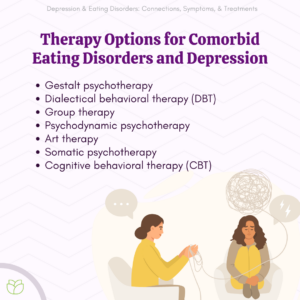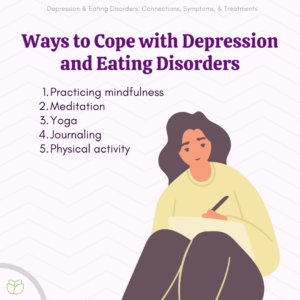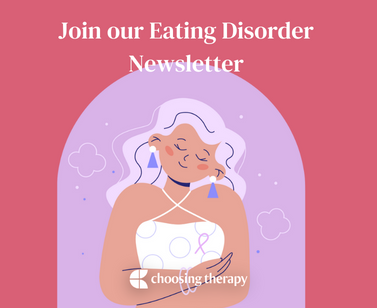
Depression and eating disorders are two separate diagnoses that are almost always co-occurring. Between 50%-75% of people with eating disorders struggle with some form of depression,1 which makes it vital to understand diagnosis when considering identifying, diagnosing, and treating the person. It is more likely that someone with an eating disorder has depression, but depression can exist without the person having an eating disorder.
Struggling with your relationship with food? Do you find yourself constantly thinking about food or your body? It can be exhausting to have these thoughts. The good news is: you don’t have to feel this way. Take the first step towards healing by taking Equip’s free, confidential eating disorder screener. Learn more
Are Depression & Eating Disorders Related?
Depression and eating disorders are closely related and co-occurring in some people. It is important to distinguish that feeling depressed and sad is normal but clinical depression is more severe and persistent. Depression is generally when someone’s depressed mood disrupts a person’s life through feelings of hopelessness, feeling sad most of the day, changes in weight, and sleep disturbance, as well as other symptoms.
In addition, the term eating disorders is a general term for an umbrella of diagnostic eating disorders. The two are related in that people with eating disorders usually restrict food such as in anorexia, binge,or binge and purge, such as in bulimia. People with eating disorders almost always have symptoms of depression having to do with low self-esteem, shame, and feelings of worthlessness.
What Is Depression?
Depression, or diagnostically called Major Depressive Disorder, is a psychiatric illness that negatively affects how you feel, how and what you think, and how you behave. Depression is characterized by feelings of sadness, a general malaise, and a loss of interest in activities that you used to enjoy. Depression can vary from person to person and can be mild to severe.
Depression can span from being mild to severe in that some people continue to function as usual and for others, depression can be debilitating. For some, depression is an internal experience where the body feels heavy and lethargic while thoughts are filled with sadness and hopelessness. For others, depression can be totally debilitating where people stay in bed, isolate, and have trouble functioning in their daily lives.
Common symptoms of depression include:
- Feelings of sadness
- Feelings of emptiness
- Feelings of hopelessness
- Lack of motivation
- Changes in sleeping habits
- Changes in eating habits
- Irritability
- Tiredness and fatigue
- Frequent of recurring thoughts
What Are Eating Disorders?
Eating disorders are behavioral conditions characterized by disturbances in eating that can range from mild to life threatening. People with eating disorders also struggle with distressing feelings and emotions associated with the intake of food. The most common eating disorders are anorexia nervosa, where the person severely restricts food, or bulimia, where the person binges and purges food. Many people have a combination of restriction and binging.
About 5% of the population exhibits eating disorders, and the onset of eating disorders usually occurs during adolescence2 but can develop at any age. Eating disorders are most common in women but affect other genders, too. The main symptoms of eating disorders include preoccupations with food, weight, and body image as well as either restricting food or binging and purging.
Common symptoms of an eating disorder include:
- Preoccupation with food
- Mood fluctuations
- Low self-esteem
- Negative self-talk
- Weight loss/gain
- Refusal to eat certain food
- Using dietary supplements for weight loss
- Exercising more than the average person without taking days off for rest, injury, and avoiding social events to exercise
- Frequent critical thoughts about yourself and body shape
- Withdrawing from social events
- Eating alone or in secret
Can One Cause the Other?
There is no concrete evidence that depression and eating disorders can cause one another—rather, they can be co-occurring disorders. Eating disorders and depression are considered heterogeneous disorders, or disorders with several etiologies or root causes.3
There is no single way to understand why one person develops depression or an eating disorder. Rather, when someone has depression and an eating disorder, a number of factors contribute such as internal and external stressors. Internal stressors can be molecular or and physiologic, and external stressors include trauma and external circumstances that affect someone’s life.
Can Someone Be Diagnosed with Both Depression & an Eating Disorder?
It is common that a person with an eating disorder has symptoms or a diagnosis of depression as well. Studies show that the most prominent symptom of anorexia nervosa in patients is disturbances in mood and self-esteem,4which are symptomatic of depression and which are the main symptoms of Major Depressive Disorder. Other symptoms of people with eating disorder include flat affect, hopelessness, irritability, insomnia, sense of worthlessness and even as severe as suicidal thoughts.5 So the two conditions can simultaneously exist together but do not cause one another.
Help For Depression
BetterHelp – Get help from a licensed therapist. BetterHelp offers convenient and affordable online therapy starting at $65 per week. Free Assessment
Talkspace – Online Therapy With Or Without Insurance. Talkspace accepts many insurance plans including Optum, Cigna, and Aetna. Typical co-pay is $30, but often less. Get started
How Are Co-Occurring Eating & Depression Disorders Treated?
A person should seek treatment in the form of help from a licensed clinical therapist when symptoms of depression and eating disorders are disrupting their lives. That may show up as loss of interest in things they used to enjoy, feelings of worthlessness, preoccupations with food and either restricting or binging.
The most successful form of treatment when someone has both depression and an eating disorder is having a collaborative-care model with the different clinicians the person needs. It is useful to start by seeing a licensed clinical therapist and from there if a psychiatrist or nutritionist is needed, then they can be part of the team as well.
Therapy
There is no best approach to treating someone with depression and an eating disorder. Instead, finding an experienced therapist who is a good fit lays the foundation for a successful therapeutic relationship. If you are new to finding a therapist, you can reference this online therapist directory or ask friends and family if they have a therapist whom they recommend. You want to find a therapist who has a specialty in eating disorders. Starting the process of seeking help is the first step toward healing and feeling better.
Therapy options for comorbid eating disorders and depression include:
- Gestalt psychotherapy: Gestalt psychotherapy is an approach that emphasizes the here and now or present moment while focusing on the relationship of the client and therapist. This is an experiential approach that incorporates the body-mind connection.
- Dialectical behavioral Therapy (DBT): Dialectical Behavioral Therapy is a type of therapy developed by Marsha Linehan, an American psychologist, which focuses on helping people accept the reality of their lives and behaviors. This approach helps people learn to change unhelpful behaviors.
- Group therapy: The fundamental goal of group therapy is to initiate a sense of belonging through the common shared experience. This can be an effective form of treatment especially for people who feel alone and isolated.
- Psychodynamic psychotherapy: Psychodynamic psychotherapy is an approach that focuses on the unconscious processes that manifest in the client’s present behavior. The goals of this type of therapy is self-awareness and understanding what factors influence present and past behavior.
- Art therapy: Art therapy is facilitated by a trained art therapist who approaches the relationship through creative approaches of expression such as expressive and receptive expression, visual and symbolic expression, and invites creative ways of communication in the therapeutic alliance.
- Somatic psychotherapy: Somatic psychotherapy is a holistic therapeutic approach that incorporates the person’s mind, body, spirit, and emotions through the therapeutic alliance. Somatic psychotherapy works to uncover deep rooted trauma in the body.
- Cognitive Behavioral Therapy (CBT): Cognitive Behavioral Therapy is an approach to therapy that emphasizes one’s distortions in thinking that are creating problems in daily life. This approach works to change thinking and behavior patterns.
Medications
Medications can be helpful in the treatment for people with eating disorders and depression. The type of eating disorder will dictate the recommended medication prescribed for someone suffering from depression and an eating disorder. Medications mostly help the mood component of eating disorders but not the behaviors of the eating disorders themselves, which psychotherapy can help with.6
Medication helps with the co-occurring disorders because eating disorders are often a way to cope with feelings of depression and anxiety. The medication targets the symptoms of anxiety and depression which will hopefully reduce the symptoms of the eating disorder. So, while medication can cure depression and eating disorders alone, medication and psychotherapy are the best way to treat the disorders.
Do you have a dietitian on your eating disorder recovery team? Nourish dietitians have experience with Binge Eating, Anorexia, Bulimia, and AFRID. Covered by insurance. 94% of Nourish patients pay $0 out of pocket. Visit Nourish
5 Ways to Cope with Depression & Eating Disorders
There are a number of approaches to manage eating disorders and depression as a co-occurring disorder. There is no one-size-fits-all approach, and rather, it is important to see what approach resonates with the person.
Here are five coping skills and tips to try:
- Practicing mindfulness: Mindfulness is a type of meditation or way of being where the individual focuses on being present and sensing what they are feeling in the moment, without judgment.
- Meditation: Meditation is a practice that focuses the body and mind to gain a sense of clarity, presence, and understanding of the mind. It is essentially a practice in focusing the mind.
- Yoga: Yoga is an ancient practice where the goal is for the body, mind, and breath to be in union. The most common Yoga practice is the asana practice, or physical postures where the practitioner opens and stretches the body.
- Journaling: Journaling is a wonderful tool to express emotions and feelings. Often journaling is a way to unload and process feelings.
- Physical activity: Physical activity is effective in lifting the mood and also getting the person connected to their mind and body. Adding daily movement, of some sort, is effective in naturally stabilizing one’s mood.
In My Experience
In my experience, people struggling with eating disorders almost always have co-occurring disorders of depression or anxiety. I find that people struggling with eating disorders and depression need holistic treatment through psychotherapy, medication management, and sometimes working with a nutritionist. Often, medication can help lift the mood and that can make working with the eating disorder more manageable.
Often clients who are struggling with an eating disorder and depression are unhappy in their current situation but are also scared to change. People with this diagnosis often have so much fear of gaining weight and losing control. But the reality is that in their current state, they often feel out of control. The eating disorder is an attempt to harness some control of themselves and their life. Once people learn that their attempt to control has become its own problem and is even causing harm, the person will likely want to find a better way of coping. Psychotherapy is hard work but worth it, especially when the person starts to experience feeling better.
Recovering from an eating disorder is challenging but worthwhile. Finding the right therapist who is experienced in working with eating disorders is critical in the road to recovery. My best advice for someone on the road to recovery is to have patience with yourself, and to know that recovery isn’t linear and takes time.
Additional Resources
To help our readers take the next step in their mental health journey, Choosing Therapy has partnered with leaders in mental health and wellness. Choosing Therapy is compensated for marketing by the companies included below.
Eating Disorder Treatment
Eating Disorder Treatment That Works – Delivered At Home. Eating disorder treatment is hard – which is why you deserve a team. Equip offers evidence-based care delivered virtually by a five-person care team, so you can achieve recovery without pressing pause on your life. We take insurance! Get a Consultation
In-Patient Treatment For Eating Disorders
Find the best local eating disorder treatment center for you. See personalized results and reviews to find the best treatment center covered by your insurance. Start Your Search
Online Talk Therapy
Are you or a loved one experiencing eating disorder symptoms? Get help from a licensed therapist. Betterhelp offers online therapy starting at $65 per week. Free Assessment
Eating Disorders & OCD
Is your eating disorder being made worse by OCD? Almost half of people with eating disorders also have OCD. Intrusive thoughts, including constantly thinking about food or your body, may be a sign of OCD. NOCD Therapists specialize in treating OCD and have an understanding of eating disorders. To learn more about receiving an OCD diagnosis and treatment options, schedule a free 15 minute call. NOCD is covered by many insurance plans. Visit NOCD
Best Online Therapy Services There are a number of factors to consider when trying to determine which online therapy platform is going to be the best fit for you. It’s important to be mindful of what each platform costs, the services they provide you with, their providers’ training and level of expertise, and several other important criteria.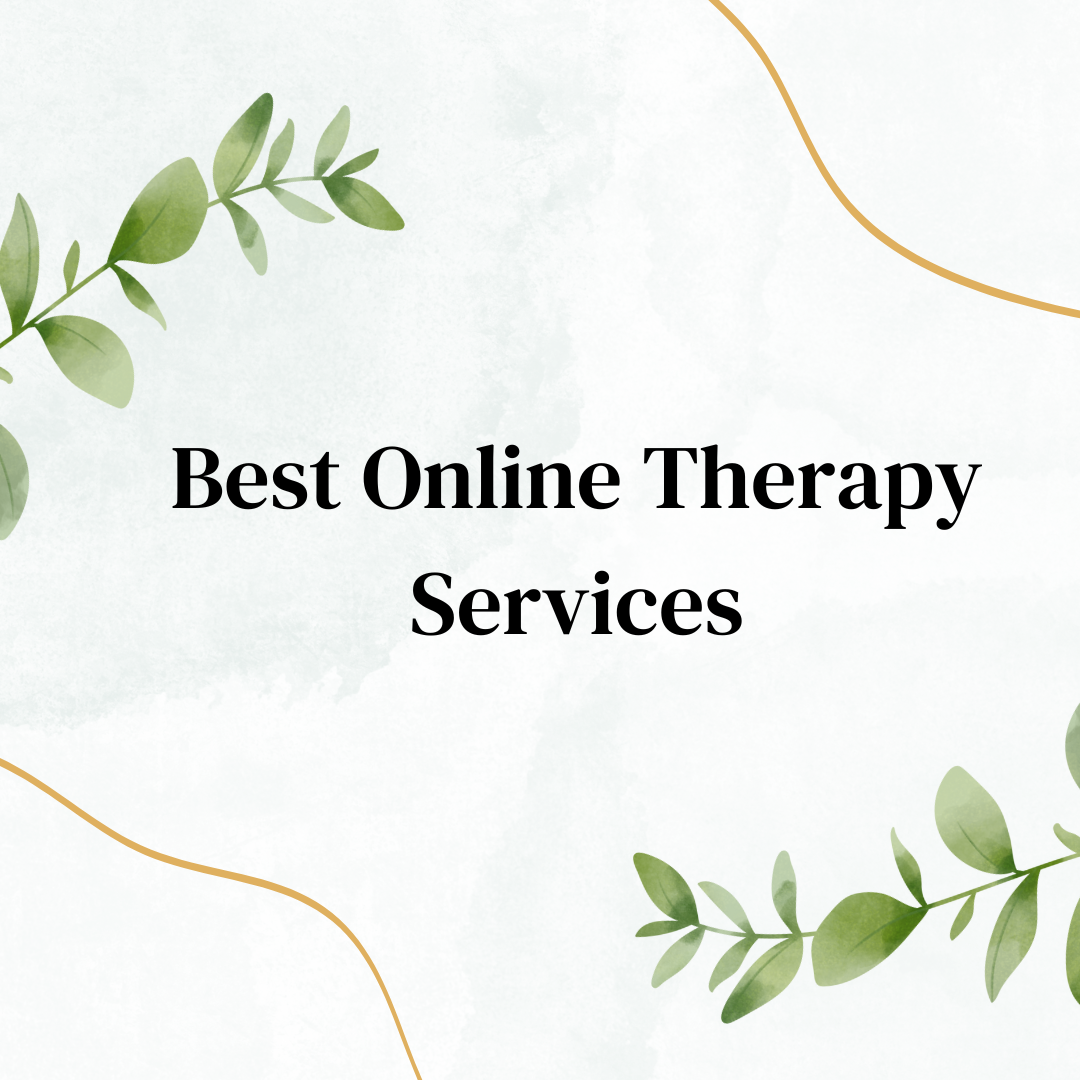
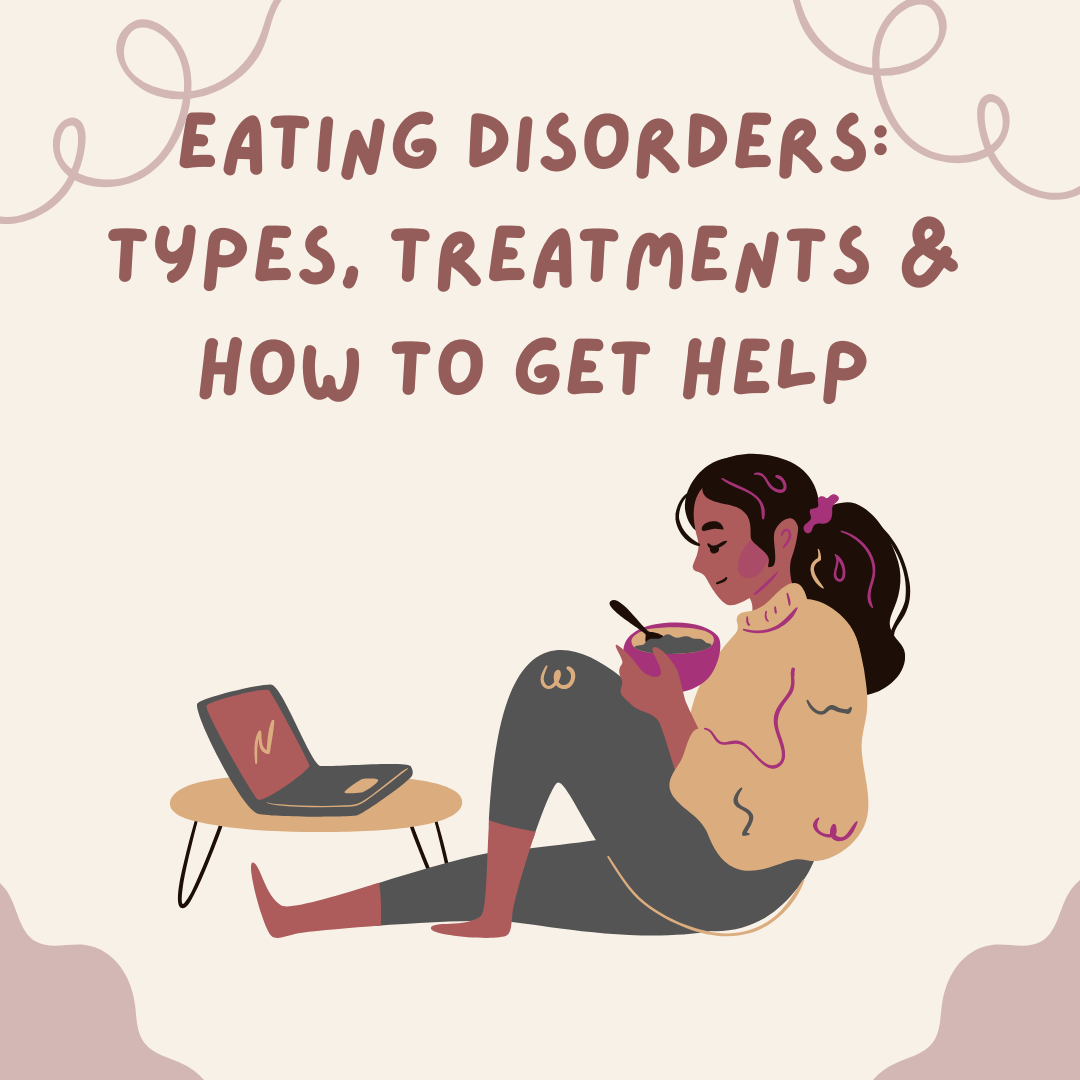
Eating Disorders: Types, Treatments & How To Get Help
If you or a loved one are dealing with an eating disorder, know you’re not alone. Treatment can significantly help improve thought patterns and symptoms that can contribute to eating disorders, and having a robust care team can be an effective prevention strategy long-term.
Find a therapist for eating disorders
Get the help you need from a therapist near you
City or zip Search





